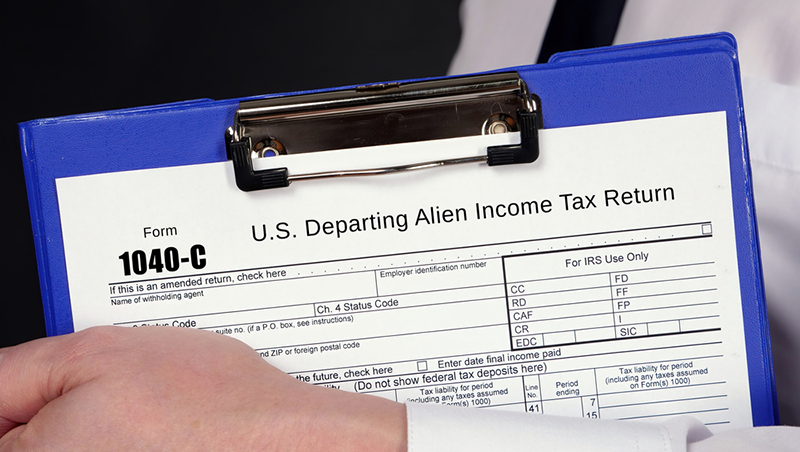U.S. Income Tax Return of a Foreign Corporation -Form 1120-F
As the owner of a foreign corporation with U.S. business activities, you have specific tax filing obligations in the United States. One of these...
When foreign nationals (non-U.S. citizens) prepare to leave the United States, they must typically fulfill specific tax obligations prior to their departure. One of the most crucial elements of this process is Form 1040-C, U.S. Departing Alien Income Tax Return. This form ensures compliance with U.S. tax laws and serves as an official statement to the IRS regarding the individual’s income earned during their stay in the U.S. Form 1040-C covers income from the beginning of the tax year up to the date of departure, and requires reporting both income received and income expected to be received before leaving.
IRS Form 1040-C is filed by aliens (non-citizens) who are leaving the United States and must resolve their tax affairs before departure. The form functions as a final income tax return that covers the period from January 1st through the date of departure. It is used to report income received or expected to be received before leaving the country. It is a preliminary return that allows the IRS to ensure that any taxes owed are paid before the individual exits the country. The taxpayer must pay the expected tax liability on this income before leaving.
Unlike a regular annual tax return (like Form 1040-NR), the 1040-C is filed before departure, providing the IRS with a means of assessing the taxpayer’s liabilities and issuing a departure permit (Form 2063 or a stamped 1040-C). Any tax paid with Form 1040-C is treated as a credit against the final tax liability or may be refunded if there is an overpayment. It is not a substitute for the annual income tax return but serves as an interim check to ensure that individuals report income and settle tax obligations before departure.
Form 1040-C must be filed if you are a nonresident alien or resident alien who intends to leave the United States and:
You are leaving the U.S. to return to your home country or relocate permanently to another country,
You have income received or expected to be received during the tax year,
You do not qualify for any of the limited exceptions.
This applies to foreign nationals in the U.S. on work visas, students who have transitioned to employment, long-term residents, and foreign investors with U.S. source income.
Resident aliens include green card holders or individuals who meet the substantial presence test. They are treated similarly to U.S. citizens for tax purposes while residing in the U.S.
A taxpayer identification number, such as a Social Security Number or ITIN, is required when filing Form 1040-C.
You must file Form 1040-C in person at an IRS office or through an IRS-authorized representative. It cannot be submitted electronically. You should schedule an in-person interview at least two weeks before your departure date to ensure the IRS has enough time to process the form and issue a tax clearance certificate (also known as a Sailing Permit).
Call the IRS at 1-844-545-5640 to schedule an appointment at a local office.
Bring supporting documents: prior year tax returns, current pay statements, details of all income, deductions, credits, identification documents, and receipts for tax payments and business expenses.
Make sure to pay all required taxes and complete any outstanding payments before departing.
Not every departing alien is required to file this form. The IRS outlines several exceptions, including:
Foreign diplomats and employees of international organizations and their legal dependents. The employer must provide documentation verifying the employee's status. These exceptions are based on the legal provisions outlined by the IRS.
Students or trainees temporarily in the U.S. under F, J, M, or Q visas with no U.S. source income other than:
Allowances received from a foreign government,
Income is exempt from tax under a U.S. tax treaty.
Individuals who receive only wages subject to U.S. withholding and are filing a regular income tax return (1040 or 1040-NR) for the year.
Despite these exceptions, it is wise to consult a tax advisor to confirm whether filing is necessary based on your unique tax profile.
Filing Form 1040-C is a high-stakes process. Errors can result in delays, penalties, or failure to obtain the required tax clearance. It is crucial to carefully follow IRS instructions to ensure your filing is accurate and avoid unnecessary complications. Here are the most common mistakes to avoid:
Filing Too Late: Failing to file early enough before your departure can lead to travel delays. Start the process at least 30 days in advance.
Incomplete Income Reporting: All U.S.-source income, including wages, self-employment earnings, dividends, and capital gains, must be included—even if it seems minimal or was already subject to withholding.
Using Estimated Figures Without Support: Supporting documentation for all income and expenses is required. Don’t rely on rough estimates—use pay stubs, brokerage statements, or bank records. Errors often occur when estimated tax payments are not properly documented.
Failing to Reconcile With Annual Return: Form 1040-C is not a substitute for your year-end return (Form 1040 or 1040-NR). You must still file your regular return after the tax year ends.
Overlooking Foreign Income or Tax Treaties: If you claim treaty benefits or foreign tax credits, be sure to reference them accurately and support them with appropriate forms (e.g., Form 8833).
Additionally, failing to provide proof of payments, including income tax payments and estimated tax payments, can delay processing.
The Form 1040-C Certificate of Completion, also known as a Sailing Permit, is an official acknowledgment from the IRS that a departing alien has met their U.S. tax obligations prior to leaving the country. Once Form 1040-C is reviewed and any taxes owed are paid, the IRS issues this certificate—either by stamping the approved 1040-C or providing Form 2063—allowing the individual to depart the U.S. in full tax compliance.
Foreign nationals who own U.S. real estate, operate a business, or invest in U.S. assets should pay special attention to Form 1040-C filing requirements.
If you sell U.S. real property, the Foreign Investment in Real Property Tax Act (FIRPTA) requires withholding. Gains must be reported in the 1040-C if the sale occurs before your departure.
Investment income may be subject to withholding taxes. Any discrepancies between the actual and withheld amounts should be reconciled in Form 1040-C.
If you are self-employed and operate a U.S. business or earn self-employment income, you must provide detailed records of your business expenses as part of your documentation. This can include a Schedule C if you’re a sole proprietor, partnership K-1s, or corporate tax filings, or state-level documentation, where applicable.
Businesses and investors can often reduce or eliminate U.S. tax on certain types of income under tax treaties. Form 1040-C allows you to claim these benefits prior to departure, but only if properly documented.
We specialize in international tax planning and compliance. Our team has extensive legal expertise in international tax law and offshore disclosure matters, including FATCA and FBAR compliance. Our expert advisors can guide you through Form 1040-C, evaluate your eligibility for exemptions or treaty benefits, and help coordinate your final departure from the U.S. with peace of mind.
No, Form 1040-C must be filed in person at an IRS office or with an authorized agent. An in-person interview is typically required.
No. Form 1040-C is a preliminary return used to report income received or expected to be received up to your departure date. You must report income on both Form 1040-C and your annual 1040 or 1040-NR return later.
Failure to file may lead to IRS penalties or enforcement action. In some cases, it may impact your ability to re-enter the U.S. or apply for future visas.
Begin the process at least 30 days before your departure and schedule an IRS appointment at least 10–14 days prior.

As the owner of a foreign corporation with U.S. business activities, you have specific tax filing obligations in the United States. One of these...

Form 8288 is the go-to document for reporting and remitting withheld amounts from specific transactions and distributions governed by sections 1445...

U.S. multinational corporations often pay taxes to foreign countries on income earned outside the United States. Taxes paid to other countries (not...
